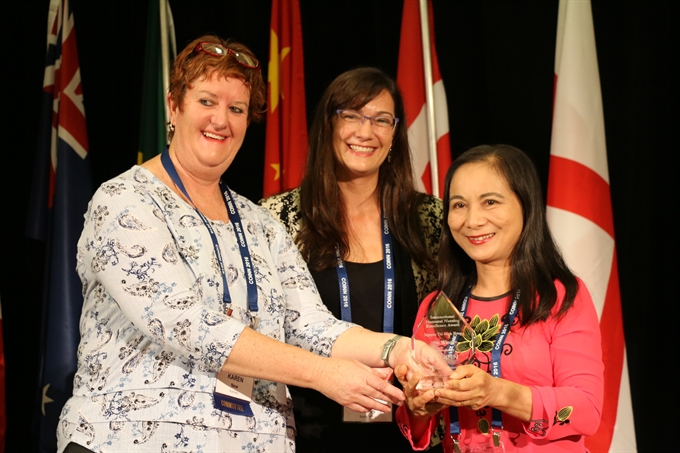 Society
Society

Vietnamese nurse Nguyễn Thị Minh Hồng has been honoured by the International Neonatal Nursing Excellence Awards for her efforts to save newborns in a poor work environment over the past 30 years.
 |
| President of COINN, Karen New (left) and Save the Children representative Mary Kinney (middle) present the International Neonatal Nursing Excellence Awards to Vietnamese nurse Nguyễn Thị Minh Hồng. Photo courtesy of COINN |
HÀ NỘI — Vietnamese nurse Nguyễn Thị Minh Hồng has been honoured by the International Neonatal Nursing Excellence Awards for her efforts to save newborns in a poor work environment over the past 30 years.
Hồng, a nurse from Trạm Tấu District, Yên Bái Province and Nigerian nurse Adeyemo Abass Kola were singled out for the prize among neonatal nurses nominated by their peers and employers in 14 countries.
The awards were presented at the opening ceremony of the ninth Conference of International Neonatal Nurses (COINN) in Vancouver, Canada.
“Mr Kola and Mrs Hong have inspired us with their leadership and their passion. If more neonatal nurses were properly supported, trained, and supplied with essential medicines and tools, we could help ensure that every newborn – no matter where – had the chance to survive birth and get a good start on life,” said Carole Kenner, COINN’s chief executive officer.
Hồng started working in the rural district of Trạm Tấu in 1982, one of the country’s 62 most impoverished districts, serving a primarily ethnic minority Hmong population. Poor roads, local customs, and language barriers have impeded access to and knowledge of good health practices around birth in the region.
Every day, she travels nearly two hours to her clinic each day, providing checkups to mothers and newborns, assisting with deliveries, and conducting family planning consultations.
Hồng has helped drive a change in cultural beliefs that discourage expecting mothers from visiting health clinics. She has learned the Hmong language, which has increased trust in the nurses and doctors who interact with the patients. As a result, pregnant women are increasingly seeking antenatal care at clinics, and more births are being attended by skilled health workers.
“The work is hard and travel is difficult,” Hồng said “But I love this job. When a delivery is done I feel so happy to welcome a new baby. And if the baby is not well, we take care of them and they get healthy after our care and I feel so honoured about that.”
In Việt Nam, the care for newborns and mothers has remarkably improved over the past few years. However, the mortality rate of newborns among regions and ethnic groups shows a significant gap. In 2014, the number of deaths of newborns under one month old in ethnic minority groups was three times higher than that in the majority group, says the UNICEF’s 2014 Multiple Indicator Cluster Surveys.
According to 2015 United Nations estimates, nearly half of child deaths under age 5 occur in the first month of life. The recently adopted United Nations Sustainable Development Goals include a commitment to reduce neonatal mortality to a rate of 12 or less per 1,000 live births by 2030 and for some countries this requires more than doubling their rate of current progress. — VNS




